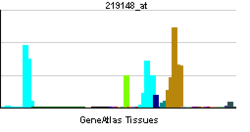- PBK (gene)
-
PDZ binding kinase Identifiers Symbols PBK; CT84; FLJ14385; Nori-3; SPK; TOPK External IDs OMIM: 611210 MGI: 1289156 HomoloGene: 32415 GeneCards: PBK Gene EC number 2.7.12.2 Gene Ontology Molecular function • nucleotide binding
• protein serine/threonine kinase activity
• protein binding
• ATP bindingCellular component • cellular_component Biological process • protein phosphorylation
• mitosisSources: Amigo / QuickGO RNA expression pattern 
More reference expression data Orthologs Species Human Mouse Entrez 55872 52033 Ensembl ENSG00000168078 ENSMUSG00000022033 UniProt Q96KB5 Q9JJ78 RefSeq (mRNA) NM_018492 NM_023209.2 RefSeq (protein) NP_060962 NP_075698.1 Location (UCSC) Chr 8:
27.67 – 27.7 MbChr 14:
66.42 – 66.44 MbPubMed search [1] [2] Lymphokine-activated killer T-cell-originated protein kinase is an enzyme that in humans is encoded by the PBK gene.[1][2][3]
The protein encoded by this gene is a serine/threonine kinase related to the dual specific mitogen-activated protein kinase kinase (MAPKK) family. Evidence suggests that mitotic phosphorylation is required for its catalytic activity. This mitotic kinase may be involved in the activation of lymphoid cells and support testicular functions, with a suggested role in the process of spermatogenesis.[3]
References
- ^ Abe Y, Matsumoto S, Kito K, Ueda N (Aug 2000). "Cloning and expression of a novel MAPKK-like protein kinase, lymphokine-activated killer T-cell-originated protein kinase, specifically expressed in the testis and activated lymphoid cells". J Biol Chem 275 (28): 21525–31. doi:10.1074/jbc.M909629199. PMID 10781613.
- ^ Gaudet S, Branton D, Lue RA (Jun 2000). "Characterization of PDZ-binding kinase, a mitotic kinase". Proc Natl Acad Sci U S A 97 (10): 5167–72. doi:10.1073/pnas.090102397. PMC 25800. PMID 10779557. http://www.pubmedcentral.nih.gov/articlerender.fcgi?tool=pmcentrez&artid=25800.
- ^ a b "Entrez Gene: PBK PDZ binding kinase". http://www.ncbi.nlm.nih.gov/sites/entrez?Db=gene&Cmd=ShowDetailView&TermToSearch=55872.
Further reading
- Zhao S, Dai J, Zhao W, et al. (2001). "PDZ-binding kinase participates in spermatogenesis.". Int. J. Biochem. Cell Biol. 33 (6): 631–6. doi:10.1016/S1357-2725(01)00005-X. PMID 11378444.
- Simons-Evelyn M, Bailey-Dell K, Toretsky JA, et al. (2003). "PBK/TOPK is a novel mitotic kinase which is upregulated in Burkitt's lymphoma and other highly proliferative malignant cells.". Blood Cells Mol. Dis. 27 (5): 825–9. doi:10.1006/bcmd.2001.0452. PMID 11783945.
- Strausberg RL, Feingold EA, Grouse LH, et al. (2003). "Generation and initial analysis of more than 15,000 full-length human and mouse cDNA sequences.". Proc. Natl. Acad. Sci. U.S.A. 99 (26): 16899–903. doi:10.1073/pnas.242603899. PMC 139241. PMID 12477932. http://www.pubmedcentral.nih.gov/articlerender.fcgi?tool=pmcentrez&artid=139241.
- Yuryev A, Wennogle LP (2003). "Novel raf kinase protein-protein interactions found by an exhaustive yeast two-hybrid analysis.". Genomics 81 (2): 112–25. doi:10.1016/S0888-7543(02)00008-3. PMID 12620389.
- Ota T, Suzuki Y, Nishikawa T, et al. (2004). "Complete sequencing and characterization of 21,243 full-length human cDNAs.". Nat. Genet. 36 (1): 40–5. doi:10.1038/ng1285. PMID 14702039.
- Nandi A, Tidwell M, Karp J, Rapoport AP (2004). "Protein expression of PDZ-binding kinase is up-regulated in hematologic malignancies and strongly down-regulated during terminal differentiation of HL-60 leukemic cells.". Blood Cells Mol. Dis. 32 (1): 240–5. doi:10.1016/j.bcmd.2003.10.004. PMID 14757441.
- Gerhard DS, Wagner L, Feingold EA, et al. (2004). "The status, quality, and expansion of the NIH full-length cDNA project: the Mammalian Gene Collection (MGC).". Genome Res. 14 (10B): 2121–7. doi:10.1101/gr.2596504. PMC 528928. PMID 15489334. http://www.pubmedcentral.nih.gov/articlerender.fcgi?tool=pmcentrez&artid=528928.
- Matsumoto S, Abe Y, Fujibuchi T, et al. (2005). "Characterization of a MAPKK-like protein kinase TOPK.". Biochem. Biophys. Res. Commun. 325 (3): 997–1004. doi:10.1016/j.bbrc.2004.10.133. PMID 15541388.
- Sabio G, Arthur JS, Kuma Y, et al. (2005). "p38gamma regulates the localisation of SAP97 in the cytoskeleton by modulating its interaction with GKAP.". EMBO J. 24 (6): 1134–45. doi:10.1038/sj.emboj.7600578. PMC 556394. PMID 15729360. http://www.pubmedcentral.nih.gov/articlerender.fcgi?tool=pmcentrez&artid=556394.
- Barrios-Rodiles M, Brown KR, Ozdamar B, et al. (2005). "High-throughput mapping of a dynamic signaling network in mammalian cells.". Science 307 (5715): 1621–5. doi:10.1126/science.1105776. PMID 15761153.
- Kim J, Bhinge AA, Morgan XC, Iyer VR (2005). "Mapping DNA-protein interactions in large genomes by sequence tag analysis of genomic enrichment.". Nat. Methods 2 (1): 47–53. doi:10.1038/nmeth726. PMID 15782160.
- Stelzl U, Worm U, Lalowski M, et al. (2005). "A human protein-protein interaction network: a resource for annotating the proteome.". Cell 122 (6): 957–68. doi:10.1016/j.cell.2005.08.029. PMID 16169070.
- Rual JF, Venkatesan K, Hao T, et al. (2005). "Towards a proteome-scale map of the human protein-protein interaction network.". Nature 437 (7062): 1173–8. doi:10.1038/nature04209. PMID 16189514.
- Dougherty JD, Garcia AD, Nakano I, et al. (2006). "PBK/TOPK, a proliferating neural progenitor-specific mitogen-activated protein kinase kinase.". J. Neurosci. 25 (46): 10773–85. doi:10.1523/JNEUROSCI.3207-05.2005. PMID 16291951.
- Olsen JV, Blagoev B, Gnad F, et al. (2006). "Global, in vivo, and site-specific phosphorylation dynamics in signaling networks.". Cell 127 (3): 635–48. doi:10.1016/j.cell.2006.09.026. PMID 17081983.
- Nandi AK, Ford T, Fleksher D, et al. (2007). "Attenuation of DNA damage checkpoint by PBK, a novel mitotic kinase, involves protein-protein interaction with tumor suppressor p53.". Biochem. Biophys. Res. Commun. 358 (1): 181–8. doi:10.1016/j.bbrc.2007.04.125. PMID 17482142.
- Oh SM, Zhu F, Cho YY, et al. (2007). "T-lymphokine-activated killer cell-originated protein kinase functions as a positive regulator of c-Jun-NH2-kinase 1 signaling and H-Ras-induced cell transformation.". Cancer Res. 67 (11): 5186–94. doi:10.1158/0008-5472.CAN-06-4506. PMID 17545598.
- Zhu F, Zykova TA, Kang BS, et al. (2007). "Bidirectional signals transduced by TOPK-ERK interaction increase tumorigenesis of HCT116 colorectal cancer cells.". Gastroenterology 133 (1): 219–31. doi:10.1053/j.gastro.2007.04.048. PMID 17631144.
Categories:- Human proteins
- Chromosome 8 gene stubs
Wikimedia Foundation. 2010.
